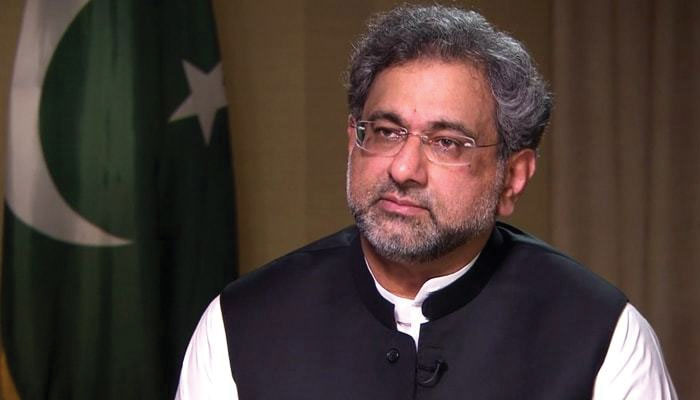PML-N views Shahid Khaqan Abbasi’s arrest as ‘worst revenge’
Pakistan Muslim League-Nawaz’s (PML-N) Sindh leaders on Friday deemed the arrest of former prime minister Shahid Khaqan Abbasi “the worst revenge against the PML-N”, saying that the arrest only exposed the country’s gradual movement towards dictatorship.
The PML-N’s Shah Muhammad Shah, MNA Kheal Das Kohistani and Ali Akbar Gujjar spoke at a news conference at the Karachi Press Club to condemn Abbasi’s arrest, describing the National Accountability Bureau’s (NAB) cases against the party’s leaders as victimisation and a form of revenge from the opposition.
Shah claimed that Abbasi’s arrest was motivated by the fact that he was to lead the opposition rally with Pakistan Peoples Party Chairman Bilawal Bhutto Zardari on July 25.
Attention was also drawn to the law enforcement agencies’ raid on Thursday at the residence of Miftah Ismail, former finance minister and the PML-N’s general secretary. Ismail was granted seven-day protective bail by the Sindh High Court a day after the raid.
The PML-N leaders went on to question why Chaudhry Pervaiz Elahi, Pervez Khattak, Jahangir Tareen and Aleema Khan had not been arrested yet, claiming them to be the real looters.
Shah said that “for PML-N, jails and arrests are not new things because the party had bravely faced the brutalities of dictators in the past”, and that such tactics are simply attempting to pave the way for other forces to come into power in the country.
He said the days of the “selected” government are numbered, and the opposition parties will observe a black day across the country on July 25.
He explained that they have organised rallies in the four provinces, with PML-N leader Shahbaz Sharif leading the rally in Lahore and the Awami National Party chief Asfandyar Wali leading the one in Peshawar.
The PML-N leader said that these protests will prompt “Imran Khan and those who brought him” to “flee”. He also expressed concern over the rising inflation rates, the curbs on freedom of expression and the targeting of political rivals through NAB.
-
 Camila Mendes Reveals How She Prepared For Her Role In 'Idiotka'
Camila Mendes Reveals How She Prepared For Her Role In 'Idiotka' -
 China Confirms Visa-free Travel For UK, Canada Nationals
China Confirms Visa-free Travel For UK, Canada Nationals -
 Inside Sarah Ferguson, Andrew Windsor's Emotional Collapse After Epstein Fallout
Inside Sarah Ferguson, Andrew Windsor's Emotional Collapse After Epstein Fallout -
 Bad Bunny's Star Power Explodes Tourism Searches For His Hometown
Bad Bunny's Star Power Explodes Tourism Searches For His Hometown -
 Jennifer Aniston Gives Peek Into Love Life With Cryptic Snap Of Jim Curtis
Jennifer Aniston Gives Peek Into Love Life With Cryptic Snap Of Jim Curtis -
 Prince Harry Turns Diana Into Content: ‘It Would Have Appalled Her To Be Repackaged For Profit’
Prince Harry Turns Diana Into Content: ‘It Would Have Appalled Her To Be Repackaged For Profit’ -
 Prince William's Love For His Three Children Revealed During Family Crisis
Prince William's Love For His Three Children Revealed During Family Crisis -
 Murder Suspect Kills Himself After Woman Found Dead In Missouri
Murder Suspect Kills Himself After Woman Found Dead In Missouri -
 Sarah Ferguson's Plea To Jeffrey Epstein Exposed In New Files
Sarah Ferguson's Plea To Jeffrey Epstein Exposed In New Files -
 Prince William Prepares For War Against Prince Harry: Nothing Is Off The Table Not Legal Ways Or His Influence
Prince William Prepares For War Against Prince Harry: Nothing Is Off The Table Not Legal Ways Or His Influence -
 'How To Get Away With Murder' Star Karla Souza Is Still Friends With THIS Costar
'How To Get Away With Murder' Star Karla Souza Is Still Friends With THIS Costar -
 Pal Reveals Prince William’s ‘disorienting’ Turmoil Over Kate’s Cancer: ‘You Saw In His Eyes & The Way He Held Himself’
Pal Reveals Prince William’s ‘disorienting’ Turmoil Over Kate’s Cancer: ‘You Saw In His Eyes & The Way He Held Himself’ -
 Poll Reveals Majority Of Americans' Views On Bad Bunny
Poll Reveals Majority Of Americans' Views On Bad Bunny -
 Wiz Khalifa Thanks Aimee Aguilar For 'supporting Though Worst' After Dad's Death
Wiz Khalifa Thanks Aimee Aguilar For 'supporting Though Worst' After Dad's Death -
 Man Convicted After DNA Links Him To 20-year-old Rape Case
Man Convicted After DNA Links Him To 20-year-old Rape Case -
 Royal Expert Shares Update In Kate Middleton's Relationship With Princess Eugenie, Beatrice
Royal Expert Shares Update In Kate Middleton's Relationship With Princess Eugenie, Beatrice




